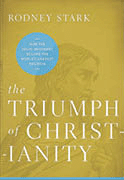Return to 2nd Quarter 2025 articles.

The Triumph of Christianity
by Rodney Stark
HarperOne, © 2012
$15.99 (paperback), 512 pages, ISBN-13: 978-0062007698

This book, written by Rodney Stark, a Distinguished Professor of the Social Sciences at Baylor University, is one of the best books we have read. Since it was published in 2012, I am surprised that it has not been more widely read and shared. The Triumph of Christianity will challenge your thinking.
The book contains some important but lesser-known facts from the time of Christ. There was no soap, sewage systems ranged from poor to non-existent, and crowded populations spread disease. Stark documents his facts, showing a vast knowledge of the teachings of scholars and media sources.
The volume of material in this book is enormous, so thoroughly reviewing it would take more space than we have available. Instead, here is Stark's summary of his book:
- The first generation of the Jesus movement consisted of a tiny and fearful minority existing amid a Palestinian environment abundant in zealots willing to assassinate even high priests for not being sufficiently orthodox and pious — let alone willing to tolerate Jews who claimed the Messiah had come.
- The mission to the Jews was probably quite successful, and large numbers of Jews in the diasporan communities outside Palestine probably converted to Christianity.
- Christianity was not a religion based solely on slaves and the lowest classes of Romans but was particularly attractive to the privileged.
- Christian mercy had such profound worldly consequences that Christians even out-lived their pagan neighbors.
- In a Roman world relatively short of women, women significantly outnumbered men among early Christians. This occurred in part because Christians did not “discard” female infants, and Christian women did not have a substantial mortality rate from abortions done in a world without antibiotics or even knowledge of germs. It also occurred because women were more likely than men to convert.
- Paganism was not quickly stamped out by a triumphant and intolerant Christianity, but disappeared very slowly and lingers in various New Age and esoteric circles.
- For centuries, there probably were more Christians in the Middle East and North Africa than in Europe. Christianity was eventually destroyed in these areas by Islamic persecution and repression.
- The crusaders were not greedy colonialists but marched east for religious motives and at great risk and personal expense. Many knowingly went bankrupt, and few of them lived to return.
- The so-called Dark Ages were not dim but one of the most inventive times in Western history.
- Despite medieval Europe's great cathedrals, most Europeans of that era were, at best, barely Christian, and few ever attended church.
- Science arose only in the West because efforts to formulate and discover laws of nature only made sense if one believed in a rational creator.
- The Spanish Inquisition was relatively temperate, and it was responsible for very few deaths. It saved a great many lives by opposing witch hunts that swept through the rest of Europe.
- Religious competition increases the level of religiousness prevailing in a society. In the long run, it also results in norms of religious civility.
- The claim that religion must soon disappear as the world becomes more modern is nothing but wishful thinking on the part of academic atheists.
- Despite the low levels of religious participation in Europe, religion is thriving, perhaps as never before, all around the globe, excluding China but including Europe. Seventy-six percent of Earth's inhabitants say religion is important in their daily lives.
- More than 40 percent of the people on Earth today are Christians, and their number is growing more rapidly than any other major faith.
If you read all 500 pages of The Triumph of Christianity, you will learn much and gain new insights.
